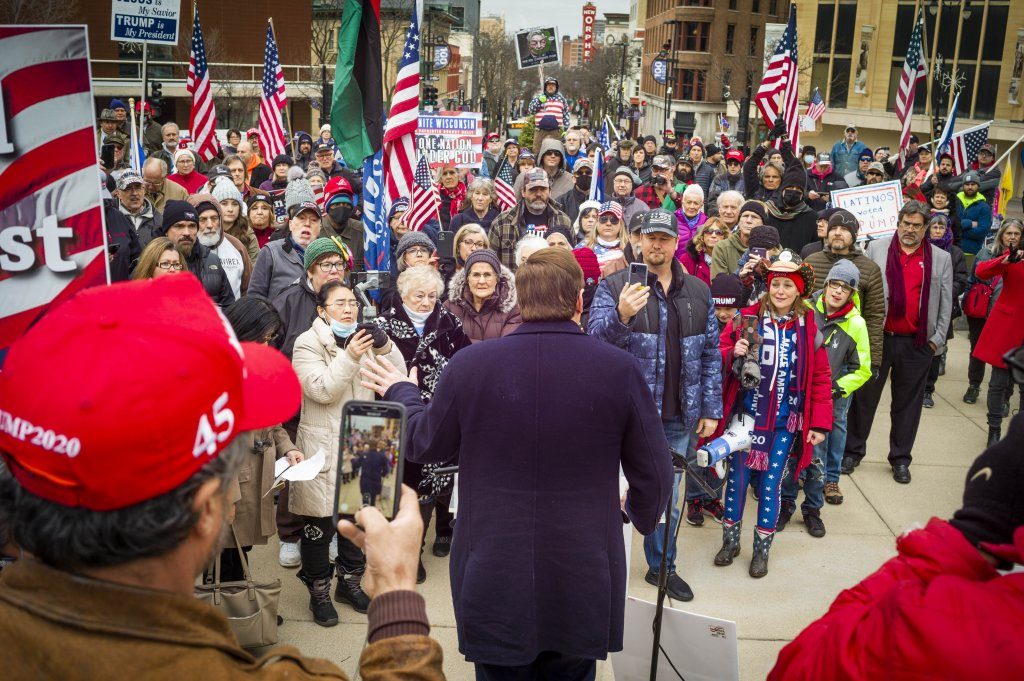WILL Report Finds Little Voter Fraud
But conservative group cites potential for future fraud, attacks election administrators.

Pro-Trump rally with MyPillow CEO Mike Lindell on the steps of the Wisconsin State Capitol Dec. 7, 2020. Photo by Luther Wu/Wisconsin Examiner.
The Wisconsin Institute for Law & Liberty (WILL), the state’s foremost right wing legal outfit, released a report on the 2020 presidential election on Tuesday which found there wasn’t any evidence of fraud in the election but still said that it was “almost certain” there was enough unlawful voting in Wisconsin to change the results.
Democrats, clean-election advocates and a spokesperson for the Wisconsin Elections Commission criticized the WILL report, saying it had inaccuracies and misinterpretations of what happened last November.
The WILL report states that the organization’s 10-month investigation was necessary because a large majority of Republican voters in Wisconsin don’t believe the results of the 2020 election, even though this belief is widely held because top Republican officials such as former President Donald Trump and Wisconsin Assembly Speaker Robin Vos (R-Rochester) have spent the last year spreading these beliefs.
“In a Marquette University Law Poll conducted in August 2021, nearly a year after the election, more than 70% of Republicans and 26% of Independents reported a lack of confidence that ‘the votes for president were accurately cast and counted in last year’s election,’” the report states. “When large numbers of voters question the authenticity of an election, their concerns, whether valid or not, need to be addressed.”
But Matt Rothschild, executive director of the Wisconsin Democracy Campaign, says this reasoning makes no sense and becomes a case of a chicken and an egg.
“That is a ridiculous justification for an endless fishing expedition,” Rothschild says. “The reason a majority of voters have doubts about the election is that Donald Trump repeats the big lie every time he opens his mouth and Republicans in Wisconsin regurgitate the big lie.”
The WILL report does state that some of the most pervasive conspiracy theories — such as a so-called ballot dump in Milwaukee and instances of fraudulent votes — about Wisconsin’s election aren’t true, but still indulges in attacks on the state’s election administration, which Rothschild says is harmful to our democracy.
“It’s refreshing WILL found ‘no evidence of widespread fraud’ and no ‘ballot dump’ in Milwaukee,” he says. “WILL’s report still went out of its way to cast shade on the elections and that’s a practice that undermines our democracy. It’s a slimy chew toy that right wingers can’t just let go of. It’s way past time for them to do so.”
“Certification of the November 2020 presidential election was based upon lawfully cast votes that were affirmed by municipal, county and state canvass certifications and multiple court decisions after reviewing these matters,” he says.
Collin Roth, a spokesman for WILL, says that the report isn’t alleging election fraud, only trying to protect against potential future fraud.
“The required legal processes for casting a ballot exist for good reasons, including the prevention of fraud and the assurance that the election is even-handed,” Roth says. “We found little direct evidence of fraud, and for the most part, an analysis of the results and voting patterns does not give rise to an inference of fraud. But that is far from the end of the matter. Failure to follow proper procedures makes fraud more difficult to detect and therefore more difficult to entirely rule out.”
Harmful to democracy
David Canon, a political science professor at UW-Madison, says having one political party refuse to accept the results of an election will have harmful long term effects — even if he agrees with WILL’s assessment that the state’s election laws could use some clarifying over some issues. He also says that nothing WILL brings up is new and much of it has already been decided in state or federal courts. And many of the issues were only occurring in 2020 because of adjustments required by the pandemic.
“It’s going to continue to undermine faith in democracy,” Canon says. “That’s the long term cost of all of this. Democracy only works when you have the losing candidate willingly give up power and reaffirm that the way to contest elections is to have fair and open elections. When you have a party that’s basically not buying into that, it does undermine the faith in democracy and that’s the very serious cost of this.”
“It is almost certain that in Wisconsin’s 2020 election the number of votes that did not comply with existing legal requirements exceeded Joe Biden’s margin of victory,” the report states, before later saying it’s impossible to know if throwing out these ballots would change the results.
“It is unclear whether, had these ballots been disqualified, the results of the election would have changed,” the report states seemingly in contradiction to its previous assertion. “It is not possible to know who these legally questionable votes were cast for and moreover, votes would have to be withdrawn pursuant to Wisconsin’s ‘drawdown’ method. Given the location of the votes it may be more likely than not that, depending on which ballots were thought to be unlawfully cast, that Trump would have wound up the winner. But because the Wisconsin Supreme Court declined to disqualify any challenged votes based on the doctrine of laches, we cannot know this for certain.”
Canon says that WILL’s point isn’t even helpful because this is questioning longstanding law that states the rules of an election can’t be changed as it is occurring.
“Every court, filled with Trump appointees and Obama appointees, they all said you can’t change the rules in the middle of the game,” Canon says. “In a way this is the wrong discussion to be having. The law is clear that once rules are established, you can’t after the fact challenge those laws.”
The report’s introduction states that the investigation aimed to find a middle ground between Republicans who believe the election was stolen and Democrats and media outlets who say that’s not true.
“We approached this work without presumption as to what it would find,” the report states. “It seemed to us that someone needed to make a serious effort to separate fact from fiction. As noted above, many Republican partisans, like Democrats before them, are convinced that there was a ‘Big Steal.’ Much of the legacy media is of the view that, since there is little or no evidence that Trump won the election, any effort to look into whether proper procedures were followed is just part of the baseless conspiracy-mongering that pushes ‘the Big Lie.’ There is nothing to see. But the truth may lie between these two poles.”
“It is based on review of the law, interviews with election officials, and careful consideration of what each ‘side’ has said about the election,” it continues. “While there are certain limitations to what this project could reasonably accomplish, we attempted to follow the evidence where it led us.”
But even though WILL’s investigation states that it aimed to find an apparent middle ground between conspiracy theorists and members of the reality-based media, many of the conclusions arise from the right wing viewpoints of an organization that fought against public health orders, for gerrymandered political maps and for expanded wolf hunting in the state. WILL routinely represents Republican officials in court cases.
Drop boxes as election villains
In explaining how WILL believes there was a significant amount of unlawful voting in 2020, the report states that one of the biggest sources of issues was the use of drop boxes for absentee ballots. The claim about drop boxes includes a misleading statement about what was found in a different examination of the 2020 election by the nonpartisan Legislative Audit Bureau (LAB).
“As recently confirmed by the Legislative Audit Bureau, the widespread adoption of absentee ballot drop boxes, encouraged by the Wisconsin Elections Commission (WEC), runs afoul of state law requirements for the collection of absentee ballots,” the report states. “This widespread adoption of absentee ballot drop boxes, not provided for under Wisconsin law, was correlated with an increase of about 20,000 votes for Joe Biden, while having no significant effect on the vote for Trump. WILL does not claim that the voters who used drop boxes were ineligible voters or should have had their votes rejected. But the ad hoc adoption of absentee ballot drop boxes without established rules, parameters, or security presents an election vulnerability and a challenge to state law.”
Vetterkind says WILL’s conclusion about drop boxes is false.
“The use of secure absentee drop boxes was lawful and the practice predates the November 2020 election,” he says.
Roth and WILL claim that because state law is silent on drop boxes, they are prohibited.
“If the law does not say anything on drop boxes, then drop boxes are not provided for,” Roth says. “The LAB does suggest that a rule might have been promulgated for drop boxes but we don’t agree. There has to be some authorization of drop boxes to warrant a rule. But even if we are wrong, a rule had to be promulgated before there can be drop boxes. There was no rule so there could be no drop boxes.”
Only once in the report does WILL state that it is currently fighting a lawsuit in Waukesha County over the issue of drop boxes, which both clarifies the reason for WILL’s position on the issue and also shows that the matter isn’t as cut and dry as the report states.
Roth says that the existence of a lawsuit doesn’t mean WILL is wrong.
“The fact that someone disagrees with us does not mean their position is strong,” he says.
The report also addresses one of Wisconsin Republicans’ favorite 2020 election punching bags — grants from an organization funded by Facebook CEO Mark Zuckerburg and his wife. Grants from this organization, the Center for Tech and Civic Life, were provided to 200 municipalities in Wisconsin to help with the costs of running the election. Republicans have honed in on the money that was given to the state’s five biggest, and most Democratic, cities.
WILL’s report states that it can show the grants led to an increase in turnout for Biden in each of these municipalities.
“Private grants for election administration from the Center for Technical and Civic Life (CTCL), a non-profit largely funded by Facebook founder Mark Zuckerberg and his wife, resulted in an increase in turnout in five Wisconsin cities — all voting heavily for Democrat Joe Biden,” the report states. “A statistical analysis finds significant increases in turnout for Democrats, approximately 8,000 votes statewide, as a result of the distribution of CTCL grants. Specifically, Biden’s vote increased by about 41 votes per municipality in cities that received CTCL grants relative to those that did not over 2016. No statistically significant effect was found for Trump.”
But the report doesn’t show how WILL is proving the grants actually caused more Democrats to vote in these cities, rather than Democrats being especially motivated to vote Trump out of office in a high turnout election.
Roth counters that the report doesn’t claim the grants convinced people to vote for Biden, just that they disproportionately went to the Democratic cities.
“We aren’t saying that CTCL funding caused people to vote for Biden,” Roth says. “We are saying that it was distributed in a way that was not even-handed and was correlated with larger turnout for the preferred party beyond what was expected from the normal voting patterns in 2020.”
WILL also claims that local elections clerks improperly maintained voter rolls during the 2020 election, failing to remove voters who may have moved, died or been convicted of a felony. WILL uses data from a 2019 list from ERIC — a multi-state organization that helps election administrators track when people move or die out of state — that was subject to a lawsuit which WILL argued in front of the Wisconsin Supreme Court.
WILL asserted that people in the 2019 “movers list” should be removed from the rolls but the WEC wanted to wait until after the 2020 election because the list had a significant amount of errors. Even though WILL acknowledged the errors when it argued the lawsuit, it still used this data as evidence of unlawful voting in 2020.
“Thousands of votes were cast by individuals remaining on the active Mover’s List,” the report states. “5,329 voters voted in the election from their old address, and 13,757 voted from a new address while in active mover status. Once again, while not every one of these votes may be illegal, it is vital for election security that we know who voters are and where they live.”
Vetterkind says that the WEC was simply complying with a court order when it didn’t remove these voters from the rolls.
“The Wisconsin Court of Appeals ruled in February 2020 that WEC could not remove voters from the registration list,” he says. “The court case, Zignego v. Wisconsin Elections Commission, was argued before the Wisconsin Supreme Court in September 2020 and no decision had been issued by the time of the November 2020 presidential election, so the court of appeals decision was still in place for the presidential election.”
Vetterkind adds that a number of the voters that WILL identifies as felons had come off parole by the time of the election and were therefore eligible to cast a ballot.
WILL also states that cases in which it can’t prove fraud don’t prove fraud didn’t happen and even after ten months of investigation it “can’t exclude” the possibility.
“A WILL poll of 2,000 absentee voters revealed a strong partisan split in absentee voting preference,” the report states. “Among those expressing a preference for one of the two major parties, only 27.4% of the sample identified as Republican, while 72.6% of the sample identified as Democrats. Our poll found a surprisingly high percentage of respondents who say they did not request absentee ballots. A higher percentage of Republicans than Democrats claim they did not request an absentee ballot than of Democrats. Most of those who said they did not request absentee ballots appear to have voted. We could not conclude that this is evidence of fraud, but neither can we exclude it.”
Before 2020, absentee voting was mostly used by older, Republican-leaning voters. But last year, as the COVID-19 pandemic raged, Democrats encouraged voting by mail while Trump demonized it.
Rothschild says the organization and other Wisconsin Republican figures are using continued attacks on the state’s elections as a tactic to win at the expense of a healthy democracy. Already this week, a group of Republicans began circulating a cosponsorship memo for a bill that would call for the resignation of five WEC commissioners and its administrator.
“It’s a ridiculous, endless, sickening sideshow that Republican organizations and leaders insist upon carrying out,” Rothschild says. “They’re continuing to fuel this obsession and this falsehood that there was something wrong with the election. That is destructive of people’s faith in our democracy, number one. Number two they are paving the way to try to dismantle the Wisconsin Elections Commission and set up a different mechanism for administering and certifying our elections so that partisan officials would be in charge and could decide who wins the election, even if it goes against the majority votes at the election … that’s not how our democracy is supposed to function.”
WILL unveils its own report on 2020 elections, finds no fraud but attacks election administration was originally published by the Wisconsin Examiner.





















So unless I’m missing something shouldn’t the headline of this article have read “WILL Report Finds No Voter Fraud” instead of “WILL Report Finds Little Voter Fraud” ?
Frustrating to read these boring articles always “talking politics” and missing the 900 billion ton elephant in the room, i.e., the corrupting influence of money in our political system. Does anyone think that any efforts to point out flaws in the WILL report will result in some serious soul searching by WILL and maybe they will “dial it back” a notch or two? Nah, that corrupting money influence is very coordinated and empowered by our legal system and unless forced to it will never stop, no matter how many times it’s claims are discredited. They don’t care what the other side thinks, there is a war going on.
WILL is just a whore, like Mciver.